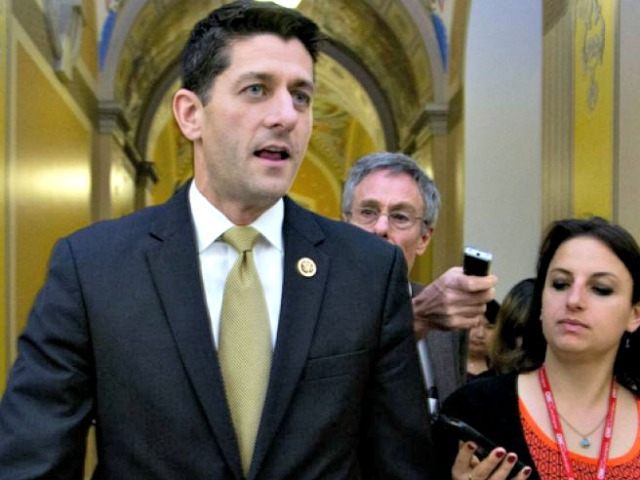The New York Times is trying to blame the GOP for General Electric’s decision to move yet another Wisconsin factory out of the United States. This time from a town adjacent to Rep. Paul Ryan’s district.
The New York Times laid the blame Oct. 25, when it portrayed the closure as one result of the GOP’s opposition to the federal Ex-Im Bank. The soon-to-be-shuttered bank subsidizes large companies — U.S. and foreign — by offering cheap taxpayer-backed loan-guarantees.
But this Wisconsin factory closure is little different from G.E.’s past decisions to close down many other high-paying U.S. factories, and to move much research and production offshore. Those closures were made when G.E. was getting valuable support from the Ex-Im bank, which is being closed by GOP opposition this year.
“G.E. has been moving jobs abroad for many years, at a time when it was the top beneficiary of Ex-Im,” Veronique de Rugy, an free-trade advocate, an economist and an Ex-Im opponent, at George Mason University’s Mercatus Center, told Breitbart News.
“G.E. has been moving its production facilities out of Wisconsin and out of the U.S. for years before the Export Import Bank was ever an issue,” said Curtis Ellis, founder of an anti-free trade group called American Jobs Alliance. “U.S. government policies do nothing to encourage companies to invest in the U.S. rather than overseas — in fact, U.S. government policies encourage G.E. and companies like them to locate and invest outside the borders of the U.S.,” he said.
Domestic closures and foreign openings are often a win for G.E. executives and shareholders, because free-trade treaties allow them to sell foreign-made products back into the United States at no penalty, even as they pocket the gains from lower foreign wages. U.S. customers do get somewhat-cheaper products–but also lose many jobs.
But G.E.’s latest shutdown decision may become a larger problem for Paul Ryan, because it hurts his district just before his likely confirmation as House Speaker. Some of the factory’s employees and beneficiaries live in his district.
That speakership job puts him at the center of the GOP’s deep internal split between a few profit-maximizing donors and millions of worried voters. That split is now focused on the free-trade treaties that export many well-paid jobs, and on the autopilot immigration laws that import more than 1 million foreign workers each year to compete for decent jobs sought by the 4.4 million young Americans who annually enter the workforce.
Ryan has already declared his support for President Barack Obama’s new Trans-Pacific Partnership treaty. In 2014, he tried to push through a huge–but still secret–immigration bill, and he has advocated for laws that allow companies to hire an unlimited number of low-wage foreign workers in place of higher-wage Americans.
GOP leaders in the House and Senate have already revealed they think the TPP deal is so unpopular that it can only get approval from Congress during the “lame duck” session just after the November 2016 elections. Increased immigration is also so unpopular that Ryan has pledged to defer any debate until 2017
The pending closure of the G.E. factory in Waukesha and the firing of 350 workers, highlights the cost paid by Ryan’s voters for his free-trade policies.
in 2004, G.E. moved the headquarters of its health-care division from Waukesha to London. In 2011, G.E. moved its X-ray technology business unit out of Waukesha to China.
Other politicians are also watching G.E. jobs flee their districts. This year, for example, G.E. is moving roughly 500 jobs from New York, Texas, Maine and South Carolina, as part of a package deal signed with the French government when G.E. bought a French engine-company.
Since 2004, the company’s U.S. employment has fallen from 165,000 to 136,000, a loss of 29,000 U.S. jobs, even though the company was getting large Ex-Im bank subsidies, de Rugy told Breitbart News. The company’s overseas employment has risen from 142,000 to 169,000, or 27,000 jobs.
The effort to blame the GOP for the Wisconsin shutdown was carried by the New York Times article, on Oct. 25.
“On the morning of Sept. 28, however, the Waukesha plant manager gathered the workers on the floor and told them the factory would be shut down. G.E., he said, had decided to shift production of the industrial engines — and the workers’ jobs — to Canada.
What happened in less than two years to change things so much? The answer is a blend of Washington politics, fast-changing markets and corporate self-interest. At the center is a politically charged dispute over a usually obscure agency, the Export-Import Bank…
When the workers assembled last month, they were told the Waukesha factory was being shut down because Congress had failed to fund the Export-Import Bank, which plays a small but often crucial role in America’s export trade.
Conservative Republicans have singled out the bank as a symbol of “corporate welfare,” saying it hands out generous subsidies, especially to big companies like G.E. This year, House Republicans blocked a vote to renew funding for the bank.”
However, the NYT’s story also included statements from G.E. officials saying restoration of the Ex-Im bank will make no difference to G.E. policies of sending jobs overseas, partly because the factory is getting fewer orders.
“John G. Rice, G.E.’s vice chairman for global opera… said, the decision is irreversible. An extension of Export-Import Bank funding, he said, would not remove the business risk that the bank might be killed a few years later…
Waukesha produced nearly 1,000 engines last year. This year, Jim Flemming, the plant manager, said, the total is expected to be fewer than 500. Next year, the outlook is for an additional 15 percent decline; the plant will close for good once the Canadian plant is operating.”

COMMENTS
Please let us know if you're having issues with commenting.